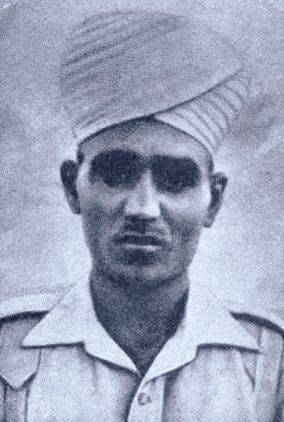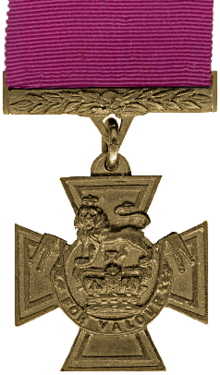Havildar Umrao Singh VC
Havildar Umrao Singh VC (21 November 1920 – 21 November 2005) was an Indian recipient of the Victoria Cross (VC), the highest and most prestigious award for gallantry in the face of the enemy that can be awarded to British and Commonwealth forces. He was the only non commissioned officer in the Royal Artillery or the Royal Indian Artillery to be awarded the Victoria Cross during the Second World War, and the last survivor of only 40 Indian soldiers to be awarded the VC between 1912, when Indians first became eligible to be awarded the VC, to Indian independence in 1947.
Umrao Singh, son of Mohar Singh, was born into a Hindu Yadav family in Palra, a small village in Jhajjar district in Haryana (then the Rohtak district of undivided Punjab), 50 km north of Delhi. Different sources give his ancestry as Ahir.
He attended a local school and joined the Indian Army during the second world war in November 1939. He was promoted to Havildar (Sergeant) in the Royal Indian Artillery, of the Indian Army in 1942.
By the end of 1944, General Sir William Slim’s 14th Army was poised for a right-flank offensive against Lieutenant-General Sakurai Seizo’s 28th Japanese Army in the coastal strip between the Irrawaddy and the Bay of Bengal. General Sir Philip Christison’s XV Corps of four divisions was given the job. The offensive was launched on 12th of December 1944 but fierce resistance was met by the 81st West African Division advancing down the Kaladan valley, every move forward being challenged by Japanese counter-attack. The 33 Mountain Battery, Indian Artillery, in which Havildar Umrao Singh was a field gun detachment commander, was subjected to a sustained bombardment from Japanese guns.
Singh’s VC citation sums up perfectly his heroic action in defending his guns against overwhelming odds:
“In the Kaladan Valley, Burma on 15 / 16 December 1944, Havildar Umrao Singh was in charge of one gun in an advanced section of his battery when it was subjected to heavy fire from 75 mm guns and mortars for one and a half hours prior to being attacked by two Companies of Japanese. When the attack came he so inspired his gun detachment by his personal example and encouragement to fight and defend their gun that they were able to beat off the attack with losses to the enemy.
Though twice wounded by grenades in the first attack, he again held off the second enemy attack by skilful control of his detachment’s small arms fire, and by manning a Bren gun himself which he fired over the shield of his gun at the Japanese who had got to within five yards range. Again the enemy were beaten off with heavy losses. Third and fourth attacks were also beaten off in the same manner by the resolute action and great courage of Havildar Umrao Singh. By this time all his gun detachment had been killed or wounded with the exception of himself and two others.
When the final attack came, the other gun having been over-run and all his ammunition expended, he seized a gun bearer and calling once again on all who remained, he closed with the enemy in furious hand-to-hand fighting and was seen to strike down three Japanese in a desperate effort to save his gun, until he was overwhelmed and knocked senseless. Six hours later, when a counter-attack restored the position, he was found in an exhausted state beside his gun and almost unrecognizable with seven severe wounds, and ten dead Japanese round him.
By his personal example and magnificent bravery Havildar Umrao Singh set a supreme example of gallantry and devotion to duty. When recovered, his gun was fit to fire and was in fact in action again and firing later that same day.”
[ London Gazette, 31 May 1945 ], Kaladan Valley, Burma, 15 – 16 December 1944, Havildar Umrao Singh, Royal Indian Artillery, Indian Army
Singh was presented with his VC by King George IVG at Buckingham Palace on 15 October 1945. The citation reads “Havildar Umrao Singh set a supreme example of gallantry and devotion to duty.”
He was promoted to Subedar Major after recovering from his wounds. He retired from the British Indian army in 1946, but rejoined the army in 1947 following independence, and served until 1965. After leaving the army a second time, he returned to farm his family’s 2 acre (8,000 m²) smallholding
After being diagnosed with prostate cancer in July 2005, he died, aged 85, at the Army Research and Referral Hospital in New Delhi on the 21st of November 2005. He was cremated in his native village with full military honors. His wife, Vimla, pre-deceased him, but he was survived by two sons and a daughter.
The Victoria Cross. In spite of personal hardship and receiving substantial offers, Singh refused to sell his medal during his lifetime, saying that selling the medal would “stain the honor of those who fell in battle”.
Source: http://defencelover.in/2013/10/01/capt-umrao-singh; http://www.tribuneindia.com/






